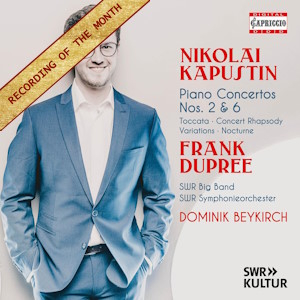
Nikolai Kapustin (1937-2020)
Variations for piano solo and big band, Op.3 (1961)
Toccata for piano solo and big band, Op.8 (1964)
Piano Concerto No.2, Op.14 (1972)
Nocturne for piano and orchestra, Op.16 (1972)
Concert Rhapsody for piano and orchestra, Op.25 (1976)
Piano Concerto No.6 for piano and big band, Op.74 (1993)
Frank Dupree (piano)
Jakob Krupp (bass), Meinhard ‘Obi’ Jenne (drum set)
SWR Big Band and SWR Symphony Orchestra/Dominik Beykirch
rec. 2023/2024, SWR Funkstudio, Stuttgart, Germany
Capriccio C5528 [57]
I was at the Royal Festival Hall for the British premiere of Nikolai Kapustin’s Piano Concerto No.5 played by the ebullient Frank Dupree, with the Philharmonia and Santtu-Matias Rouvali. Orchestral musicians don’t often smile during concerts but everyone seemed to be a having a thoroughly good time during this one. That’s Kapustin for you – a good-time composer of notated jazz set in an orchestral context.
Capriccio is building a strong portfolio of Kapustin’s music, one that looks likely to become a first port of call for those who want his concertos and sundry other works in splendid sound, authoritatively performed by Dupree and confrères. This latest disc presents the Second and Sixth Piano Concertos and four small-scaled but nourishing pieces bursting with musical personality. The Second Concerto dates from 1972 and is composed for orchestral forces not just those for big band, in the jazz sense. This is in three movements and opens with a dapperly syncopated first movement in which Meinhard ‘Obi’ Jenne is heard on his drum set, as he is pretty much throughout. Kapustin writes hummable tunes, attractively orchestrated, and kids you that you’ve heard some of the themes before but have forgotten them until now. His Andante isn’t a conventional classical one, as Kapustin is so busy writing avuncular and boldly projected ideas that he hasn’t the desire to write a ‘proper’ slow movement preferring, instead, snappy, zesty, droll writing that picks up 1960s grooves. His finale is a frisky Toccata, crisply chorded and eventful.
Concerto No.6 was composed over two decades later and occupies a rather different stylistic location, less focused on straight-ahead swing and more welcoming of rather more modern directions in jazz. Kapustin never called himself a jazz pianist as everything was precisely notated but his writing always has the uncanny ability to make you think it’s been improvised. So it is in No.6, another three-movement work conventionally laid-out. In this work he inveigles an electric bass which vests the sonority with a slinky, funky vibe, but the cocktail-orientated piano is, as ever, busy to the point of constant motion. One notices that his orchestral voicings are more advanced, less block sectional than previously and consequentially more fluid and varied in brass and winds. Kapustin inevitably offers Stride patterns for his piano protagonist and he does so here though they’re less overt. The piano takes a cadenza in the first movement and in the second the music is, unlike the bustle of No.2, genuinely a Larghetto with reflective writing. The finale is one of his rolling giocoso affairs, almost a Toccata in effect, music of richly approachable vitality.
The smaller works offer Kapustinesque virtues in abundance. The Variations of 1961 may be brief but as an entrée to the disc it offers boppish swing served up on a bed of music that you could swear encoded quotations from the Great American Songbook. It’s followed by the Toccata, once again for piano and big band, recorded for the first time in full – there’s a shorter version – that goes into Stride and is a fiery example of his art with a richly vibrant punchy big band part. The Nocturne for piano and orchestra was composed in the same year as the Second Concerto and is a luxurious example of Kapustin’s art whilst the Concert Rhapsody (1976), split into an Introduction and Humoresque, starts with bluesy licks and moves into sub-Rachmaninovian chording, suffused with ripe romanticism. The Humoresque then offers quixotic cocktail piano, and a funky film score vibe, Austin Powers-like, which slows to a reverie to end.
This is another splendid Kapustin disc from Capriccio. It’s played with just the right level of orchestral jazz elements. It never sounds kitsch, and in Dupree we have just about the best player of Kapustin before the public.
Jonathan Woolf
Buying this recording via a link below generates revenue for MWI, which helps the site remain free



















